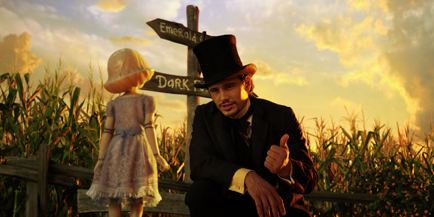Movie Review: Oz the Great and Powerful
By Matthew Huntley
March 19, 2013
BoxOfficeProphets.com

Sadly, one of the biggest problems is the casting of James Franco as the title character. Normally I’m not so quick to call out the acting as a movie’s handicap, but in this case, Franco makes an exception. It’s not that he isn’t talented (see 127 Hours); he just isn’t right as the Wizard of Oz. Too often during the movie I could “see” him acting (if you know what I mean) and it was especially obvious when he was interacting with digital characters that weren’t actually there. Although he’s likable and enthusiastic, convincing he is not, and he comes across as rather stiff when he should be loose and lively. It may be a cliché to think so, but an actor like Johnny Depp would have been much more credible and droll in the role.
Franco plays Oscar “Oz” Diggs, a con-artist and fraudulent magician in a traveling circus. Of course, we know he’s eventually destined to become the Wonderful Wizard of Oz, and his journey begins in 1905, when he’s whisked away from the dusty and black & white (at least to us) world of Kansas in a hot air balloon by a cyclone. It transports him to the colorful and magical - and widescreen - world of Oz, which has, among other things, deep hues, fairies, talking monkeys, witches (wicked and good), munchkins, a yellow brick road, and just plain old jolly, hardworking people who like to sing and dance extemporaneously.
When Oz arrives, he’s greeted by a witch named Theodora (Mila Kunis), who claims she’s not wicked. She informs him of the prophecy that says a wizard will come and save Oz from the real wicked witch and restore order and peace to the land, which has been out of sorts since the previous king was killed. Oz falsely claims to be that wizard, although his intentions are driven mostly by the king’s riches, power and his own burgeoning ego.
With the help of Finley (voice of Zach Braff), a talking monkey with wings who dresses in a bellhop uniform and swears a lifetime allegiance to Oz after he saves him from a lion, Oz promises Theodora and her older sister, Evanora (Rachel Weisz), that he’ll trek out to the Dark Forest and destroy the wand of the wicked witch. Along the way, he rescues a China Porcelain Doll (Joey King), before discovering the wicked witch isn’t so wicked after all. Her name is Glinda (Michelle Williams) and she’s actually a good witch and daughter of the former king. She’s fair, gentle, dresses in white, and has a great deal of hope, even for the faulty Oz. Despite his moral shortcomings, she believes he’ll find the good inside himself and restore faith to the people of Oz just as her father did.
Much like the original Wizard of Oz, to which this film makes many allusions, the story essentially centers on a journey of good defeating evil, which again comes in the form of a wicked witch, or in this case, two wicked witches, after Theodora and Evanora reveal their true selves and one of them takes on the trademark green skin and high-pitched, menacing laugh that Margaret Hamilton made so famous over 70 years ago. They monitor Oz and his newly formed posse with their crystal ball and send out their flying baboons to wreak havoc.
On paper, this is a charming tale from the world of L. Frank Baum, and I was excited when I first learned a Wizard of Oz prequel was being made (to the movie’s credit, it doesn’t bang us over the head with too many references to the first film; it mostly stands on its own), but I just never felt it come alive. It’s overlong and there’s a consistent lack of energy as the story runs around in circles with one conflict after another. And despite all the special effects, there wasn’t a truly thrilling sequence that got my mind racing and heart pumping with sheer delight. Just when we should be in a state of awe, the movie sort of plods along and we sit back with steadfast apathy instead of keen interest.
It’d be wrong, and mostly futile I think, to compare Raimi’s film to Fleming’s. After all, the latter is practically an institution in our collective consciousness, so juxtaposing the two wouldn’t be fair. But speaking of Oz the Great and Powerful strictly as a standalone fantasy adventure, despite all its good intentions, it didn’t inspire or charm me the way Raimi intended. I think the first clue to that is, after seeing the movie, Oz was a place I never found myself wanting to go.